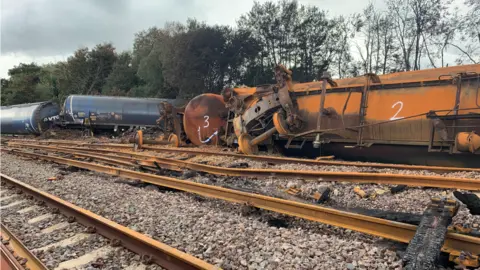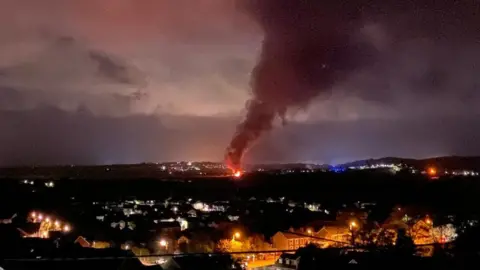Llangennech rail crash: Brakes jammed before train derailed
 BBC
BBCA freight train derailed after the brakes on a wagon became jammed, a preliminary investigation has found.
The train, carrying diesel, derailed near Llangennech, Carmarthenshire, in August, causing a major fire and 330,000 litres of fuel to spill.
The Rail Accident Investigation Branch (RAIB) said a set of wheels became worn down due to the applied brakes and came off the tracks at a junction.
A full investigation is still being carried out.
The locomotive was pulling 25 tank wagons, each containing up 75 tonnes of diesel or gas oil from Milford Haven, Pembrokeshire, to Theale, near Reading, on 26 August.
At "some point", the brakes on all wheels of the third wagon became jammed on, RAIB found.
Three of the four axles continued to turn, although their brakes were dragging, but the front axle stopped rotating, causing the wheels to be worn down and a "raised lip" to form on the outside of the tread.
This "false flange" then caught on the converging stock rail at Morlais Junction and distorted the track, leading both wheels to derail at 30mph (48km/h).
When the train reached points 100m further on, the partly-derailed wagon did not follow the direction of the engine and front wagons. Instead it rolled over, detached from the wagon in front and caused the following nine wagons to also derail, at about 23:15 (BST).
 Adam Tilt
Adam Tilt"The train driver looked back and saw a fire had started in the wreckage. He uncoupled the locomotive from the first wagon and drove it around 400 metres away from the train," the report said.
"The derailment and subsequent damage to the wagons resulted in a significant spillage of fuel and a major fire."
About 300 people were evacuated from homes nearby amid the blaze, and National Resources Wales fears long-term pollution of the Loughor estuary.
The RAIB investigation continues.